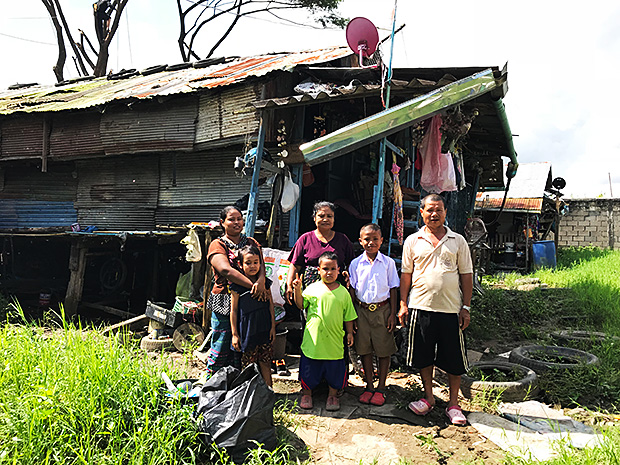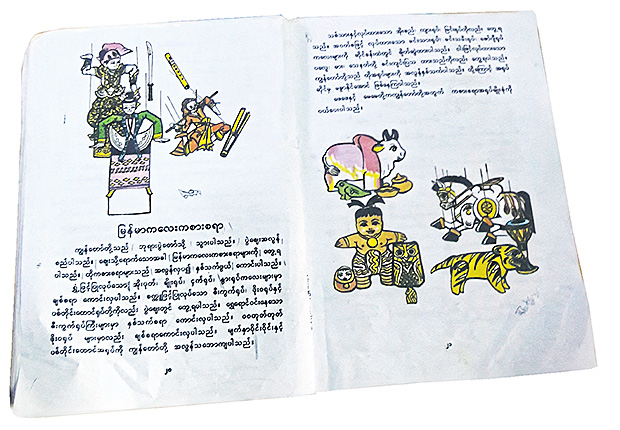Fourteen-year-old Lamzambi lives in abject poverty in a border town of Mae Sot in Tak province. Coming from a migrant family, she lives with her mother and siblings in a shack with no electricity and running water. After her father died, the family remains dependent on three older children who work in the town market.
If there is one thing that brightens Lamzambi's future it is the fact that she has been attending a Thai school for five years. This has enabled her to read and write Thai at third-grade level.
"I teach what I learn in school to my mother and older siblings who are illiterate. In fact, I get my mother to practice the Thai alphabet when she is not busy scavenging for things to sell to supplement the money my older brother sends us," Lamzambi said.
Religious discrimination in Myanmar which led to a lack of opportunities has become one of the important human rights issues that drive many to Thailand in the hope of a better future. But education for impoverished children of Myanmar Muslim migrants in Mae Sot and Phop Phra districts of Tak province has made great strides in the last decade, thanks to help from the International Organization for Migration (IOM), Help Without Frontiers (HWF) and the Burmese Migrant Workers' Educational Committee (BMWEC).

Migrant children learn about safe migration through interactive games at a Migrant learning centre in Ranong. Photo: Benjamin Suomela
IOM statistics report the majority of Myanmar Muslims surveyed have lived in Thailand for over five years; nearly half of them or around 48% had no formal education and over one in four or 26% were unable to read or write. The majority are daily wage workers at local markets and construction sites while the rest earn by garbage picking.
Unlike their parents, the children are in a better position when it comes to their future as they have the option of picking one of two types of school.
The first option is Thai public schools funded and operated by the Thai Ministry of Education. Under Thailand's 2005 "Education For All" policy, every child in Thailand, regardless of nationality or legal status, is granted access to basic education.
Migrants who attend Thai public schools join Thai students and follow the national curriculum set by the Ministry of Education in classes that are conducted in Thai language.

Ohmar Moe, 10, second from right, hopes to become a policeman. His parents scavenge for a living. Photos: Yvonne Bohwongprasert
The second option is the Migrant Learning Centres (MLCs). These are largely funded privately by NGOs or community-based organisations, and are mainly staffed by teachers who are migrants themselves. These schools follow the non-formal education curriculum taught in Myanmar and subjects are taught in the Myanmar (Burmese) language. To obtain official certificates, students in Mae Sot have to take official exams in neighbouring Myawaddy in Myanmar.
"I am grateful I can study, however, I am not sure what I would like to be when I grow up. Whatever it is, I know with an education I can get a good salary and care for my family," Lamzambi said. "My life without schooling would mean spending the entire day helping my mother clean our home and carry water from the well."
Lamzambi says she prefers to reside in Thailand because she can get an education and have a bright future. "In Myanmar, we had even less than what we have today. Despite the adversities we face here I still feel we are much better off."
Bright-eyed Ohmar Moe, 11, is also the only child in his family of six children that was picked to attend a Thai government school by his parents, who depend on their son-in-law for monthly financial support. The extra support enables the family to have electricity and running water.

Keeping up with their ability to read and write their native language.
Ohmar's family came to Mae Sot over a decade ago. His elder sister helps him with homework as she had the opportunity to study Thai earlier.
"My parents want me to reside in Thailand for a long time so they picked for me to study in a Thai school. I love it here. Thai students and teachers are nice to me. Learning to read and write Thai helps me to better assimilate within Thai society and culture more freely. It also teaches me to respect elders and be a good citizen of this country.
"Unlike in Myanmar, Thai schools take us on field trips to many interesting places. I have gained a lot of knowledge for which I am thankful."
Ohmar hopes he is able to study in Thailand for as long as possible. "I want to become a policeman one day. For that, I would need to study a lot and get a degree. I know in my native Myanmar I would not be given opportunities to follow my dreams, so I am hopeful to given the chance to do so here."
Naing Naing Aye, has opted to study at Pyo Kinn Migrant Learning Centre [MLC], where apart from learning Thai and English, she gets to brush up on her Burmese reading and writing, because her parents feel she should not forget her native language in case they return to Myanmar.
The 14-year-old, who resides with her parents who work as labourers at the local market, shared her feelings of getting the opportunity to study. "Of course, I am delighted to study because education is important for my future regardless if I am in Thailand or Myanmar," said Naing Naing, who is taking night classes in the hopes of furthering her education in the Thai system.
"We are very poor, so my elder sister opted for me to use whatever money we save as a family on the expenses needed for my education, even though it is very little. She is illiterate and does not want me follow in her footsteps. I feel bad for her because she has to look after our sick parents and do odd jobs to earn a pittance.
"It is my dream to be a teacher one day. I want to teach everyone, so they can have a good future. Each day I count myself lucky to be able to be the one in my family to have an education."
KIDS ON THE EDGE OF A CIVIL SOCIETY
Eva Maria, education programme manager of the European Union-funded Help Without Frontiers (HWF), and Kyar Htae, co-ordinator for The Step Into Education project under HWF, said an unknown number of children in Tak province have no access to education or quit school due to their family's economic condition.
Children in marginalised Muslim communities are among the most vulnerable in Tak province. Moreover, the stress in migrant communities due to the lack of documents for legal stay especially affects this group, since they have more challenges to obtain household registration from Myanmar and thus the Myanmar National ID card.
Life talks with them about the situation facing these young Myanmar Muslim migrants.
Do all Myanmar Muslim migrant families have equal opportunities to send their children to study in Thai schools?
Thailand has adopted an Education for All policy in line with Unesco recommendations, meaning that all children have the right to access basic education. Once enrolled, the students are given one uniform set per academic year as well as everything that the government supports all students with: milk and sometimes lunch (depending on the school) as well as stationery.
Transportation is not included in government support, and remains a major hindrance for many children from poor families.
The main obstacle for a Myanmar Muslim family to enrol their child is the complicated and time-consuming enrolment process in addition to costs such as additional uniforms, transportation and stationery.
Could you suggest ways on how to tackle these issues in both short- and long-terms goals?
Caregivers need legal status and increased job opportunities, especially female caregivers.
Raising awareness of the importance of education is crucial since many caregivers have themselves had a short education period. Many dropped out of school after Grade 2.
Caregivers need to be provided with information on educational pathways for further education and future careers.
Has EU funding has played a big role in enabling NGOs to collectively support education for migrant Myanmar Muslims children?
Without this co-operation, funded by the European Union, it is highly likely that the majority of these students would have continued to be unschooled and would face uncertain futures.
Results come in the increasing number of students that are being helped. Below are two such projects.
The STEP project, in co-operation with the IOM, supports the education of 191 students from marginalised Myanmar Muslim communities. Out of 191 students, 172 students are enrolled in Thai government schools and 19 students are enrolled in migrant schools.
In the REACT project, 548 students are receiving support for the 2018-2019 academic year. Of these students, 444 are enrolled in Thai government schools. Thus, HWF supports 616 migrant students enrolled in Thai government schools.

